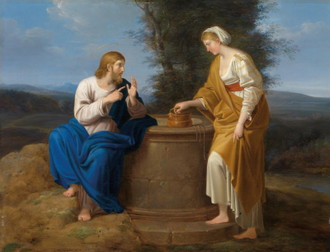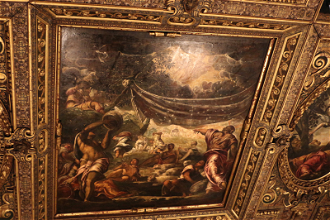Today's Gospel in Art - Jesus and the woman at the well

Christ and the Samaritan Woman at the Well, by Ferdinand Waldmüller 1818 © Christian Art Today
Gospel of 15th March 2020 - John 4:5-16,19-26,39-42
Jesus came to the Samaritan town called Sychar, near the land that Jacob gave to his son Joseph. Jacob's well is there and Jesus, tired by the journey, sat straight down by the well. It was about the sixth hour. When a Samaritan woman came to draw water, Jesus said to her, 'Give me a drink.' His disciples had gone into the town to buy food. The Samaritan woman said to him, 'What? You are a Jew and you ask me, a Samaritan, for a drink?' - Jews, in fact, do not associate with Samaritans. Jesus replied:
'If you only knew what God is offering and who it is that is saying to you: Give me a drink, you would have been the one to ask, and he would have given you living water.'
'You have no bucket, sir,' she answered 'and the well is deep: how could you get this living water? Are you a greater man than our father Jacob who gave us this well and drank from it himself with his sons and his cattle?' Jesus replied: 'Whoever drinks this water will get thirsty again; but anyone who drinks the water that I shall give will never be thirsty again: the water that I shall give will turn into a spring inside him, welling up to eternal life.'
'Sir,' said the woman 'give me some of that water, so that I may never get thirsty and never have to come here again to draw water. I see you are a prophet, sir. Our fathers worshipped on this mountain, while you say that Jerusalem is the place where one ought to worship.'
Jesus said: 'Believe me, woman, the hour is coming when you will worship the Father neither on this mountain nor in Jerusalem. You worship what you do not know; we worship what we do know: for salvation comes from the Jews. But the hour will come - in fact it is here already - when true worshippers will worship the Father in spirit and truth: that is the kind of worshipper the Father wants. God is spirit, and those who worship must worship in spirit and truth.'
The woman said to him, 'I know that Messiah - that is, Christ - is coming; and when he comes he will tell us everything.' 'I who am speaking to you,' said Jesus 'I am he.'
Many Samaritans of that town had believed in him on the strength of the woman's testimony when she said, 'He told me all I have ever done', so, when the Samaritans came up to him, they begged him to stay with them. He stayed for two days, and when he spoke to them many more came to believe; and they said to the woman, 'Now we no longer believe because of what you told us; we have heard him ourselves and we know that he really is the saviour of the world.'
Reflection on the Painting
Waldmüller was one of the most important Austrian painters of the Biedermeier period, an era in Central Europe between 1815 and 1848, during which the middle classes grew in number, and the arts appealed to common sensibilities, becoming popularised. Everyone wanted to buy some art, and thus artists turned to classical painters to find inspiration and produce works in large numbers. Our painting composition is based on a work by Annibale Caracci from 1604. The colours are crystal clear, rich in their variation. Jesus' blue cloak contrasts with the opposite yellow of the cloak of the Samaritan woman. The soft blue sky with white touches of clouds finds similar tones in the tunics of Jesus and the woman. The yellow stone of the well is reflected in the Samaritan woman's dress. As you can see, this painting is all about playing with colour. It is pleasing to the eye. The mountain in the background and its structure resemble the holy Mount Gerizim of the Samaritans. Jesus and the woman are barefooted, indicating they are taking their time to talk, whilst resting. His gestures indicate that He is in the middle of explaining things to the Samaritan woman: one finger indicating the One Truth He is talking about in today's reading, and also pointing towards His other hand… which will be pierced with a nail very soon… The purity of depiction of Jesus in our painting today is in stark contract with the horrendous death he will soon suffer.
As Jews and Samaritans had been fighting for over 400 years at this stage, this story would have been very surprising to the followers of Jesus. A Jew asking hospitality of a Samaritan would have been unheard of. Jesus has no time for racial narrow-mindedness and religious prejudice, He just sees her as a person and approaches her as a person. He acknowledges the woman as an equal. It is precisely because Jesus treats her with such sensitivity and openness that she can be totally honest with Him and be her true self. Words of openness, kindness and encouragement can bring about daily resurrections of hope in people…
LINKS
Today's story - https://christianart.today/reading.php?id=359
Christian Art Today - https://christianart.today/


















